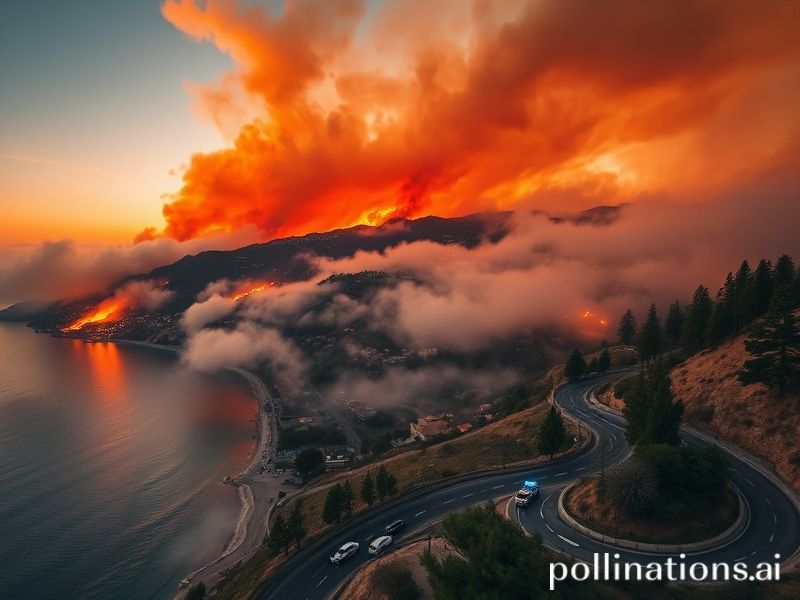Antalya Burns While the World Books Flights: Turkey’s Riviera Becomes the Planet’s Hottest Warning Shot
Antalya, Turkey—Where the Sun Now Comes with a Side of Smoke
By Our Correspondent Who Packed SPF 50 and a Fire Blanket
ANTALYA, Turkey — In the glossy brochures, the Turkish Riviera is still a sun-kissed miracle of turquoise water and all-inclusive cocktails. In real time, it looks more like the inside of a tandoor someone forgot to clean. For the third consecutive week, wildfires—some suspiciously close to newly zoned resorts—have turned pine forests into expensive kindling, forcing tourists to swap beach selfies for evacuation-center TikToks. Authorities blame record heat, low humidity, and that timeless villain “climate change,” while local wags mutter about construction permits and mysteriously underfunded fire services. Choose your own apocalypse.
Global Context, or Why Your Scandinavian Cousin Is Also Sweating
The Antalya fires are not merely Turkey’s problem; they’re the latest domino in a planetary conga line of combustible summers. Siberia is smoldering like a poorly extinguished cigarette, California has re-branded “fire season” as “fire lifestyle,” and Greece is marketing itself as the Mediterranean’s hottest new sauna. Each blaze sends its own plume of carbon skyward, nudging the global thermostat up another smug notch. Somewhere in Davos, a middle-manager responsible for “sustainability messaging” just updated his LinkedIn to “thought arsonist.”
The International Implications, Because Even Disasters Are Globalized
Tourism, Turkey’s second-largest currency earner, is getting a crash course in irony: visitors who flew in on discount airlines to “reconnect with nature” are now reenacting Dunkirk in pedal boats. European insurers, already punch-drunk from last year’s floods, are quietly rewriting risk tables so that “Turkish beach holiday” sits between “petting zoo in Chernobyl” and “ice sculpture festival in Hades.” Meanwhile, Russia—ever the helpful neighbor—has offered firefighting planes in exchange for… well, let’s just say Ankara’s shopping list now includes both water bombers and a second S-400 battery. Nothing says solidarity like mutually assured fire suppression.
Broader Significance, or How to Monetize Armageddon
Fires, like pandemics and crypto crashes, reveal the circuitry of modern life: fragile, interlinked, and spectacularly flammable. Supply chains wobble when Turkish tomatoes and hazelnuts roast on the branch, sending Nutella addicts into existential crisis. Shipping lanes hiccup as ports close for “air-quality concerns,” which is corporate-speak for “our cranes are melting.” And climate-linked migration gains another footnote: when the orange skies over Antalya start looking like Los Angeles, Angelenos can no longer pretend their own evacuations are a quirky regional quirk.
Human Nature, Now Available Char-Grilled
Observe the ingenuity of homo sapiens under duress: hotel chains rebranding smoke inhalation as “peat-infused aromatherapy,” influencers livestreaming #Firecore fashion (ashes as highlighter, apparently), and local entrepreneurs charging tourists for “authentic disaster experience” packages—towel, bottled water, and a laminated certificate that reads “I Survived the Inferno and All I Got Was This Lousy Existential Dread.” If Dante were alive, he’d add a tenth circle for marketing departments.
Conclusion: The Sun Also Rises, But Now It’s Wearing Oven Mitts
In the end, Antalya’s fires are less a local tragedy than a global postcard from a future nobody ordered. They remind us that the bill for convenience—cheap flights, cheaper concrete, and a decade of pretending physics doesn’t read the comments—has come due. Next year’s brochures will no doubt tout “authentic carbon-neutral sunsets” and “fire-adjacent eco-lodges,” but for now the Riviera is an open-air cautionary tale. Pack your bags accordingly; the world is hot, the prosecco is flat, and the Wi-Fi password is “smokeSignal2025.”







